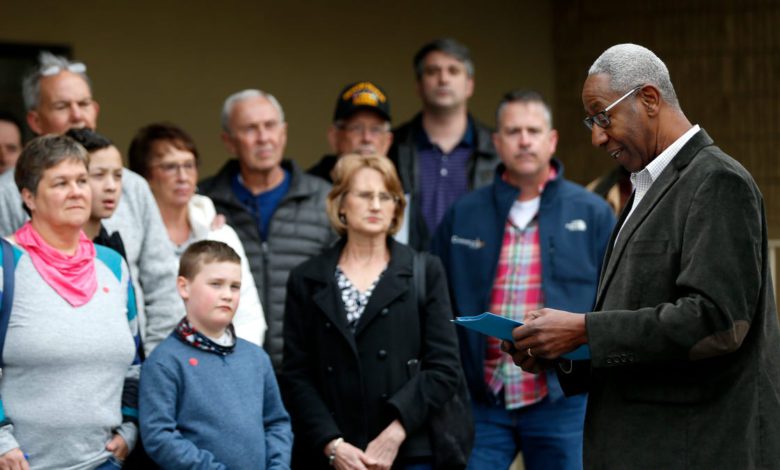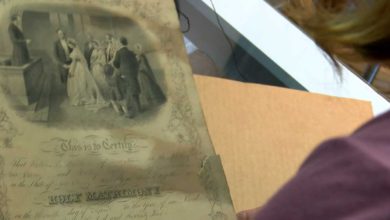
Growing up in Arkansas, Jared Middleton remembers learning only the basic facts of events with heavy racial dynamics, such as the Civil War and the civil rights movement.
It wasn’t until George Floyd’s murder in May 2020 that Middleton, a high school special education teacher in Springdale, Arkansas, began to scrutinize history lessons that didn't include multiple perspectives or discussions of lasting implications. He wants his own son to get "a more complete history" of how the nation was founded, he said.
Recognizing that schools have long ignored the history of people of color, many teachers have endeavored to incorporate lessons on topics ranging from the Tulsa race massacre to the Chinese Exclusion Act. But conservatives across the country are alarmed by how, exactly, teachers are adding nuance to discussions of race and racism in U.S. history classes. In Arkansas and more than a dozen other states, lawmakers have introduced or passed new laws to curtail or re-direct the tone of those lessons.

Now teachers are pushing back. On Saturday, groups in more than 22 cities are organizing rallies and other events to protest legislative efforts to restrict the scope of such conversations.
Becky Pringle, president of the National Teachers Association, the country's largest teachers' union, said the organization is weighing legal action against laws restricting how racism and history are taught.
"And we'll defend any teachers brought up on charges," she said.

The events Saturday may include speeches or resemble a pop-up American history fair, Pringle said.
The National Education Association is supporting the effort. The lead organizer is the Zinn Education Project, an initiative of two liberal nonprofits, the Washington, D.C.-based Teaching for Change and Milwaukee-based Rethinking Schools. Black Lives Matter at School, a national coalition that advocates for racial justice in education, is also involved.
"Our children deserve to be taught authentic, connective histories," said Tamara Anderson, a member of Black Lives Matter at School and an organizer of Saturday's events in Philadelphia. "Indigenous, Black, Latino, Asian and other people of color make up the fabric of what is actually America."
Pennsylvania's Republican lawmakers have introduced a bill that would penalize schools that teach about the country's racist and sexist past.
Similar battles are unfolding in other states.
Florida's state Board of Education on Thursday put tougher guidelines on how public schools teach U.S. history. Critics chanted, "Allow teachers to teach the truth," during the meeting, which forced a recess.
In Iowa, Gov. Kim Reynolds, a Republican, recently signed a law that will ban schools from making students “feel discomfort, guilt, anguish or any other form of psychological distress” because of their race or sex, among other provisions.

Michigan GOP leaders introduced legislation that would limit discussions of the lasting effect of race and racism in U.S. history. The bill would cut funding to schools where the curriculum includes material from The 1619 Project, a series of stories published in 2019 by The New York Times that examines the role of slavery in the country's founding.
Bill sponsors and other conservatives claim more inclusive history education drifts from straight facts and into a radical model of race theory that unfairly makes white children feel bad about the legacy of their ancestors.

"America is the sort of country that we should want to belong to," said Charles Fain Lehman, a fellow at the Manhattan Institute, a conservative think tank based in New York City that is critical of the movement to blame society's ills and inequities on racial injustice.
"The account of history becomes derogatory," Lehman said. "There’s a difference in saying, 'We have done evil things,' from the stronger claim that America is essentially racist."
Organizers of Saturday's Day of Action said the goal isn't to declare the country racist, but to push back against the pro-white, nationalistic history education that's long dominated classrooms, in large part thanks to the legacy of school segregation. Many of the textbooks still used today were influenced by pro-Confederate groups. What's more, while most students today are people of color, eight in 10 teachers are white.

The bills rarely mention the phrase “critical race theory.” But many of their sponsors have cited the term in promoting the legislation, arguing that such education is “un-American” and teaches students that their race determines their merits.
They said it's inappropriate to push upon students the concepts of systemic racism, unconscious bias, white privilege and white fragility.
Critical race theory is an approach adopted by law professors in the 1970s who tried to understand why traditional civil rights lawsuits weren't prompting meaningful reforms. They theorized it's because race is central in American society and because earlier, more deliberate practices of racial exclusion led to current inequalities.
For example, because banks once refused to offer loans to Black people, rates of homeownership and accumulated family wealth are far lower today for Black Americans today, compared to white people.
Christopher Rufo, a senior fellow at the Manhattan Institute and director of its critical race theory initiative, has written that critical race theorists "promote the concepts of race essentialism, collective guilt, and race-based harassment in public institutions," which is why states are seeking to ban them, he wrote in City Journal, published by the Manhattan Institute.
The pressure on teachers is immense, potentially forcing them to choose between their legal responsibilities and their moral ones. Racial justice advocates say that pressure is intentional – an effort to bully educators into continuing to teach a whitewashed version of U.S. history.
"There’s a long-overdue reckoning happening right now around George Floyd and race in this country that bad-faith actors on the conservative side want to shut down," said Chris Stewart, an activist and CEO of brightbeam, an education nonprofit.
"The reckoning from one side is to shut it down by never talking about it, and to stop your teachers from exploring it, because we don’t want to feel bad about it," Stewart said.
Even in states that aren't considering specific bills, outrage over critical race theory has erupted at the local level, putting many teachers on edge over what they can and can't discuss with students.
“These laws are really just ways to restrict civil rights while using civil rights language,” said Lisa Covington, a sociology of education Ph.D. candidate at the University of Iowa who serves on the Day of Action planning committee.

American schools have long struggled with how to teach U.S. history.
What is taught is decided locally, by individual districts and school boards, and heavily influenced by the textbooks boards adopt. That's why middle school history lessons in Arkansas can look different from lessons in Montana and Massachusetts classrooms.
“There will never be national or regional agreement on how we are going to teach social studies,” said Stefan Lallinger, an instructor at American University’s education school in Washington, D.C., and a fellow at the Century Foundation, a progressive think tank in D.C.
Lallinger, a former middle school social studies teacher, said this isn't the first time people have tried to downplay or hide some of the difficult realities of the nation's past.
That's why the Zinn Education Project advocates for history lessons that emphasize working people, women, people of color and social justice movements, and it offers educators free teaching materials. The project is named after Howard Zinn, a historian, playwright and anti-war activist who wrote the popular progressive book, "A People's History of the United States."
"The core function of the social studies classroom is to explain what actually happened in history and how that has an impact on society today, to make children better future participants in our democracy," Lallinger said.
In September 2020, when former President Donald Trump was running for re-election, he accused Democrats and teachers of attempting a "liberal indoctrination of American's youth" through alternative views of the nation's history. He responded by creating a "1776 Commission" to promote what he called "patriotic education." The report from the commission, released as he was leaving office, downplayed the role of slavery and derided the civil rights movement.
A group of conservative scholars, many of them Black, created alternative history resources in the same spirit, called "1776 Unites." The curriculum materials offer "authentic, inspiring stories from American history," according to the website.

Advocates for the Zinn project started organizing Saturday's rallies a few weeks ago after launching an online campaign for teachers to "pledge to teach the truth," about the role of racism and oppression in U.S. history. Almost 3,000 people had signed as of Wednesday.
The rallies, aimed at making the campaign more visible, are planned for locations that symbolize America’s fraught racial history, such as the African American Civil War Memorial in Washington, D.C., and the site of a Black man's lynching in 1861 in downtown Milwaukee, Wisconsin — a now trendy intersection of bars, restaurants, and art museums.
In New York City, faculty and students from New York University are planning to gather outside Stonewall, the gay bar police raided in 1969, which sparked riots and the movement for LGBTQ rights.
Heather Smith, a 42-year-old middle school technology teacher, is organizing the rally in Youngstown, Ohio. She had little exposure to the full history of segregation until she began reading about it in her late 30s, she said, and she's spent the past several years educating herself on systemic racism and grassroots activism.
House Republicans in Ohio introduced a bill in late May that would ban schools from teaching critical race theory, which its sponsors called dangerous and divisive.
Smith, 42, works in a school with predominantly white teachers and predominantly Black students. She signed the pledge, started a Facebook group and partnered with local education activists. She reached out to a former student, who is Black and owns a clothing company, to create T-shirts promoting the pledge’s message.
The Youngstown rally will be held at the city's only remaining public swimming pool.
“I want people to pledge to teach the truth no matter what the law says,” Smith said.

Middleton, the Arkansas teacher, is organizing his community’s rally at a Trail of Tears marker in Springdale, Arkansas. He's never led a protest. But he's spent the past year reading about race and listening to more views from people of color. He's begun connecting historical injustices to the disproportionate amount of Black men killed by police.
He's determined to offer his students a broader lens of history even if Arkansas ends up barring him from discussing certain aspects of race in America.
“There are not many things I’m willing to lose my license over," he said. "But the truth – and advocating for my students – is one of them.”
Contact Alia Wong at [email protected]. Follow her on Twitter at @aliaemily.
Contact Erin Richards at (414) 207-3145 or [email protected]. Follow her on Twitter at @emrichards.
Published
Updated
Source link








